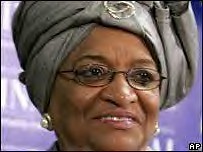
Liberian President Ellen Johnson-Sirleaf Seeks to Rebuild the War Torn Nation in West Africa
Originally uploaded by Pan-African News Wire Photo File.
President of Liberia
On this page, profile by
David Harris
14 Nov 2005, by David Harris - PhD research student
From Liberian cabinet minister to senior UN administrator and now presidential election winner at the second attempt, Ellen Johnson-Sirleaf's career has never stood still. Having served as a finance minister in William Tolbert's True Whig government in the 1970s, Johnson-Sirleaf announced her intention to stand as senatorial candidate in the 1985 elections in opposition to the military rule of Samuel Doe. For a brave speech heavily critical of Doe, she was sentenced to ten years imprisonment, of which she served two short periods of detention, one before and one after the 1985 election, before fleeing the country. Doe went on to win the election through widespread intimidation and almost certainly fraudulent counting.
The years in exile until returning for the elections of 1997, gave her considerable international experience at the Citibank in Nairobi, the UNDP and the World Bank. She held the post of Director of the Regional Bureau for Africa at the UNDP, formulating development strategies for African economies, and was Senior Loans Officer at the World Bank.
Although initially giving support to Charles Taylor's 1989 invasion to oust Samuel Doe, Johnson-Sirleaf has been an implacable opponent ever since. Returning to Liberia after the conclusion of the 7-year civil war, she was a late entry to the presidential race as standard-bearer of the Unity Party. Her non-involvement in the war and her financial expertise were a mainstay of her campaign message and she endeavoured to put across the image of an untainted, maternal figure. However, while her history of opposition to the Doe government was well known, she was also seen as a former minister in a government with a questionable record and, despite mixed ancestry, a member of the old urban elite.
Although also known as the 'Iron Lady', Johnson-Sirleaf was up against Taylor's huge electoral machine and the feeling in the country that only Taylor's presence in the Executive Mansion would avert a return to war. Johnson-Sirleaf came a creditable second to Taylor's landslide 75% of the vote, but in fact only polled 10% and drew a mere 16% of her total vote from the predominantly rural areas outside Montserrado.
Charged with treason by the Taylor regime, she was quickly forced into another period of political exile, but maintained her promise to contest the 2003 elections, until the postponement of the polls early in that year. In the turmoil of the new civil war between the rebel groups, LURD and MODEL, and the Taylor government; the departure of Taylor under internal and external pressure into exile in Nigeria in August 2003; and the search for peace and a new administration, Johnson-Sirleaf remained firmly at the forefront of Liberian national politics. Finally, and once again as standard bearer for the Unity Party, she won the 2005 elections after a disputed run-off with the footballer George Weah, becoming the first African woman to win a presidential election.
No comments:
Post a Comment